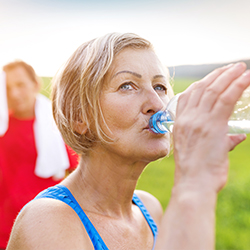
Heat can cause heart problems
Hot temperatures of over 30 degrees can be a problem for many people - especially those with cardiovascular problems. There is a risk of serious health consequences: sudden drop in blood pressure, circulatory collapse or heat stroke.
People with heart failure, high blood pressure or other cardiovascular problems often experience the following symptoms in hot weather:
- pronounced tiredness
- concentration problems
- dizziness
- exhaustion
- muscle cramps
- cardiac arrhythmia
- sudden drop in blood pressure during movement ("blackness before the eyes") and
- circulatory problems up to and including circulatory collapse.
We have put together some tips for you that we hope will help you get through the summer in good shape.
Tips for cardiovascular patients in the heat
Compensate for fluid deficiency
Many people, especially the elderly, do not have a strong sense of thirst. So it can easily happen that on hot days and especially after physical activity we lose too much fluid without regenerating accordingly. Therefore: Don't forget to drink in summer! How much extra you should drink depends on the respective temperatures and physical activities and can therefore vary from day to day. As a rough guideline, one to two litres are often given in addition to the other drinking quantity in hot weather, although the actual additional requirement, especially due to physical activity, can also be significantly higher. To get a rough idea of how much more you need to drink due to physical activity, you can use the following method: Weigh yourself before exercise and subtract your weight after exercise from that. Add up your average drinking amount and you have the fluid loss.
Pay attention to electrolytes (blood salts)
Heart patients should pay attention to their potassium balance in hot weather. A too low potassium level in the blood (hypokalaemia) can impair heart function and lead to cardiac
lead to cardiac arrhythmias. Mineral water is suitable for quenching thirst. For higher electrolyte losses, vegetable broths are recommended.
Adapt activities to heat - avoid heat
Heart patients should try to adapt their daily routine to the weather. In hot weather, for example, they should avoid lunchtime and postpone many activities to the morning or evening hours.
Make sure you cool down
Cooling down is not only good for your own well-being, it also relieves the strain on your heart. Therefore, you should think about taking regular heat breaks. For example, go into cool rooms or to a particularly shady place. A lukewarm shower can also work wonders.
Choose the right clothes
If clothing is too thick or too tight, the body cannot cool down optimally through sweating and evaporative cooling. Therefore: the more airy and the less, the better! Loose, breathable clothing is recommended, for example a loose dress, comfortable shorts or a loose linen top.
Keep an eye on blood pressure and medication dosage
High temperatures over a longer period of time cause the blood vessels to dilate. This means that blood pressure drops. Medicines for high blood pressure then have a much stronger effect in the usual dose. If the blood pressure drops too much, circulatory problems or even a circulatory collapse can be the result. It may therefore be necessary to reduce the medication dose under medical supervision.
Such medications are, for example:
- Diuretics, dehydrating medications for the treatment of heart failure and/or high blood pressure.
- Blood pressure reducers such as
- ACE inhibitors
- Sartans
- Calcium antagonists
Tip: Check your blood pressure daily when it is hot. Always consult your doctor if your blood pressure is significantly different from your usual values. Do not make any independent medication changes without first consulting your medical care.
People taking diuretics are at risk of dehydration in summer. It is well known that diuretics remove a lot of fluid and salts from the body. At the same time, a lot of water and electrolytes are lost due to increased sweating in summer. Symptoms of dehydration can range from headaches and confusion to unconsciousness.
Discuss a possible dose change with your doctor. He or she will consider whether you should take your medicine at a different dose and for how long. Under no circumstances should patients reduce the dose of their medicine or stop taking it altogether without consulting your doctor.
Prefer a light diet
Meals that are too rich and fatty put unnecessary strain on the body. On warm days, the following applies:
- Many small portions are better than a few large ones.
- Light meals with fresh fruit and vegetables, e.g. a fruit salad, yoghurt with fruit or a vegetable soup, are good.
Regular exercise
The best way to get fit for hot weather is to keep moving. Just 30 minutes a day can go a long way. Sports like walking, cycling, jogging or swimming are advised.



